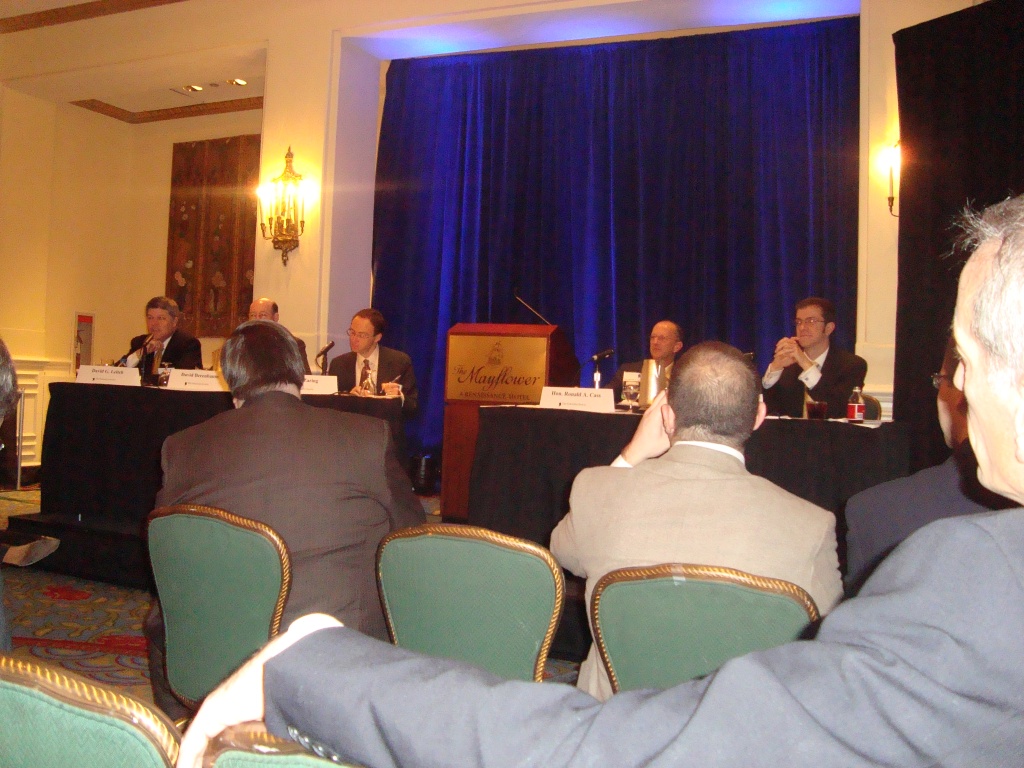Administrative Law: Breakdown of the Public-Private Distinction: Implications for the Administrative State
Saturday, Nov. 14
10:45 a.m. – 12:15 p.m.
Chinese Room
Public Corporations regulated by public agencies
Basic regulatory model subject to a variety of regulations that blur line between public and private
First widespread use of government corporations came during WWI, Great Drepression, and WWII
WWII, 58 Gov corporations
Government Corporation Control Act cut back on number of gov corporations and increased transparency and accountability
Government appointed boards of directors. Some designated agencies of United States, some not.
Some owned or controlled by the government.
Line has blurred.
GM & TARP. GM Financial Institution within meaning of TARP.
GM Bailout done on “thinnest of legal reads.” It was rushed and minimal debate.
Executive only stepped in after House bill died.
Clear example of raw executive power with no discernible power.
Looking forward, no guidance in law from government’s ownership of GM. How should gov manage GM? What are rights and duties? Should goal be to maximize taxpayer recover?
This is not the rule of law, but extreme deference to the executive.
More, after the jump.
Berenbaum
There is no private mortgage industry anymore. Today, 90% of mortgages are from Fannie or Freddie.
SEC continued to give AAA rating to sub-prime paper.
Dodd proposal is most significant thing to date. Assignee liability, preemption, holder in due course are all intertwined.
This is not a crisis brought on by lending to minorities and low-income buyers. Only 6% of bad loans were instituted by banks regulated by Community Reinvestment Act.
GLB deregulating Glass-Steagle played important role.
If we have enforcement regulatory regime that promotes responsive lending, win-win for everyone.
Next year major part of bubble will hit. Between 2010 and 2011 White middle income people will face foreclosure because of Option-Arm crises; mortgages will double.
David Zaring
“I’ve always wondered if Washington is Hollywood for Ugly People?” [Uneasy laughter]
Blurring of public-private distinction
J.W. Verret
[youtube=http://www.youtube.com/watch?v=15eyw2QxTqY]
Very funny story about posting pictures of Ken Feinberg, much like George Washington posted pictures of Ethan Allen. Video soon.
Even sub 10% ownership government exercising shareholder control. Shareholder duty to maximize shareholder wealth. Shareholder status not fun status. But gov receives sov immunity.
Shamless plug for Treasury Incorporated
SEC Act exempts U.S. Government, including restrictions on insider trading.
Big question is off-balance sheet subsidies.
Tarp Recipient Ownership Act (authored in parts by Verret) provides hope. Any tort recipient in which Gov has over 10% interest covered. Trust, managed by 3 trustees, requirement to sell out by 2011. Provision for exception to fast track, continue TARP. Similar to AIG trust with 3 trustees.
My thoughts on the Bailout:
[youtube=http://www.youtube.com/watch?v=julnt19Pl8E]
